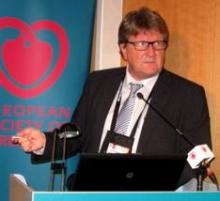"In our experience at Saarland University Hospital with more than 400 patients, they all achieved a blood pressure response" following RD, he said. "How long will [their response] last? No one knows, but if it lasts for at least 3 years, you can then justify a redo," a repeat treatment, although he also cautioned that so far, he knows of no patient who has undergone RD a second time.
In addition to the new evidence for pleiotropic effects from RD reported at the meeting, recently published reports from small studies provided preliminary documentation of other possible benefits. For example:
• RD led to a significantly reduced prevalence of albuminuria during 6-month follow-up in a study with 88 treated patients with drug-resistant hypertension (Hypertension 2012;60:419-24).
• RD led to significant improvements in glucose metabolism and insulin sensitivity during 3-month follow-up in a study with 37 treated patients with drug-resistant hypertension (Circulation 2011;123:1940-6).
• RD produced a reduction in blood pressure during exercise without affecting chronotropic competence during 3-month follow-up of 37 treated patients with drug-resistant hypertension (J. Amer. Coll. Cardiol. 2011;58:1176-83).
Novel Catheter May Speed Procedure Times
The Symplicity renal denervation catheter from Medtronic is not the only such device in clinical use. At the meeting, researchers reported 3-month follow-up results from a series of 46 patients with drug-resistant hypertension treated with a multielectrode catheter from St. Jude at four centers in Greece and Australia.
The main difference between the St. Jude EnligHTN device, which has four separate electrodes at its tip, and the Medtronic device, with a single electrode, is that the St. Jude device can denervate a renal artery with a single placement, as opposed to the four different placements, with rotation, used for the Medtronic device, meaning less arterial manipulation. Whether this will produce any discernable difference in safety, efficacy, or procedure time remains unclear.
The study enrolled patients with persistent hypertension, with an office systolic pressure above 160 mm Hg (150 mm Hg in patients with diabetes), despite treatment with at least three antihypertensive drugs, including at least one diuretic (similar enrollment criteria as the Symplicity studies). The patients’ averaged 60 years old, and their pressures averaged 176/98 mm Hg.
Average procedure time was 34 minutes, reported Dr. Costas Tsioufis, a professor of cardiology at the University of Athens, which may be modestly faster than the usual procedure time using the Symplicity catheter, which operators often estimate to require 40-50 minutes. Data from a series of 344 patients treated with the Symplicity catheter at Saarland University Hospital in Homburg showed an average procedure time of 44 minutes, said Dr. Felix Mahfoud, a cardiologist there.


